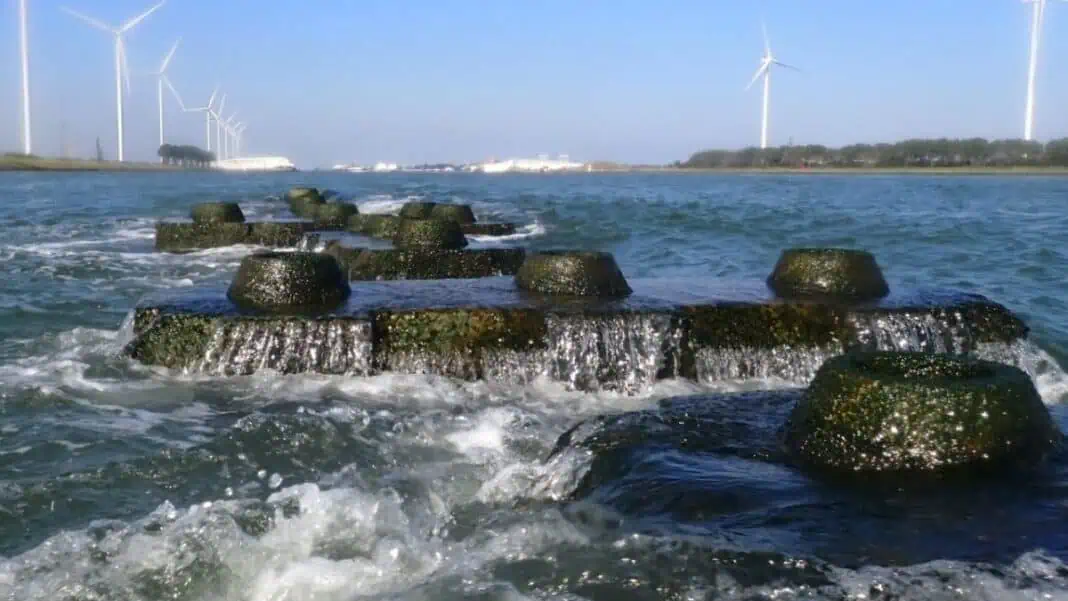Two years after deploying the pioneering Rotterdam Reef, the consortium of Rijkswaterstaat, the Municipality of Rotterdam, Boskalis, and Reefy proudly presents the results: Reefy’s engineered Reefblocks have simultaneously stabilized the coastline and boosted marine biodiversity, proving that critical infrastructure projects can actively enhance ocean ecosystems.
In 2023, 17 Reefblocks were installed in the Port of Rotterdam’s busiest shipping channel near Rozenburg, creating the modular Rotterdam Reef. These concrete blocks form the backbone of a living reef. Each block, measuring 3 meters in length and weighing 6 tons, is designed to withstand heavy wave impacts while fostering a vibrant underwater landscape. Featuring tunnels, shaded passages, and rough textures, the structure creates a dynamic ecosystem where fish, crabs, and shrimp can thrive, offering protection for both coastlines and marine life.
The project’s success is credited to strong collaboration among partners. Boskalis led the installation of the Reefblocks, drawing on their expertise in hydraulic engineering and coastal defence. Rijkswaterstaat championed the initiative for nature-inclusive infrastructure in the Port of Rotterdam. The Municipality of Rotterdam supported innovation and ecological monitoring, gathering valuable environmental data. Reefy developed the modular technology, seamlessly merging coastal protection with ecosystem restoration.
Reefblocks are revitalizing the Port of Rotterdam’s busiest shipping channel: more species, cleaner water, stronger ecosystem.
- A Haven for Marine Life: Monitoring shows the reef offers shelter to a variety of marine species, including fish, crabs, and shrimp.
- Boost in Biodiversity: The rough surfaces of the Reefblocks encourage the growth of shellfish and algae, leading to three times higher biodiversity compared to standard concrete.
- eDNA Research Insights: Studies confirm the Port of Rotterdam’s main channel serves as a crossroads for freshwater, saltwater, and migratory fish species. The Reefblocks support fish migration and naturally enhance water quality through filtration.
- Improved Water Quality and Ecosystem Health: The open structure of the Reefblocks promotes continuous water circulation, creating a healthy habitat for aquatic organisms.
Reefblocks have proven their strength in extreme weather and are ready for broader deployment.
- Storm Resilience: All 17 Reefblocks remained stable during severe storms, including Storm Poly (July 2023).
- Wave Attenuation: The reef structure reduces wave action and promotes sediment build-up behind it, contributing to coastal protection and erosion prevention.
- Stronger Shorelines: The Reefblocks enhance the resilience of coastlines against storms and flooding.
- Ready for Global Application: The innovation is prepared for larger-scale rollouts worldwide.
Through the Rotterdam Reef project, the consortium contributes to meeting the goals of the European Water Framework Directive, aimed at improving habitats for plants and animals and enhancing overall water quality.
“This project proves that nature and infrastructure can truly strengthen each other. The Reefblocks offer a sustainable, scalable solution for water safety and ecological restoration. We are ready to scale the technology globally and are already working on projects ranging from rivers in the Netherlands to the tropical Caribbean in Mexico!” – Leon Haines, Co-founder and CTO of Reefy
“Rijkswaterstaat values hydraulic innovations that contribute to ecological restoration. Thanks to strong collaboration with the Municipality of Rotterdam, Reefy, and Boskalis—and the motivation of all involved—we turned our ambition to innovate into a successful pilot. The knowledge gained opens new opportunities for the future.” – Ehsan Nouzari, Environmental Manager, Water Framework Directive, Rijkswaterstaat
“Our collaborative approach has yielded a great result, offering opportunities for national and international upscaling. Learning by doing helped us bridge the gap from lab testing to real-world application, where concrete and biodiversity work hand in hand.” – Petra de Groene, Director of Economy and Sustainability, Municipality of Rotterdam
“The motivation and collaboration among all partners were crucial to this pilot’s success. At Boskalis, we developed a specialized grab tool to efficiently install the Reefblocks, providing not only a practical solution but also valuable field experience. This project showcases how innovation and teamwork can drive sustainable marine engineering solutions.” – Samantha Haage, Program Lead Artificial Reefs at Boskalis
Thanks to collaboration with PortXL, Diergaarde Blijdorp, TU Delft, and Deltares, the Rotterdam Reef project has laid a strong foundation for the future of nature-inclusive water management.












